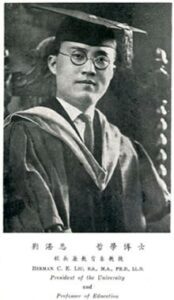Liu Chan-en (1896-7 April 1938), known as Herman Liu, prominent Baptist layman, educator, and civic leader in Shanghai. He served as educational secretary of the national committee of the YMCA in China from 1922 to 1928 and as president of the University of Shanghai from 1928 until his assassination in 1938.
Hanyang, where his parents were active members of the Northern Baptist mission, was the birthplace of Herman Liu. He received his primary and secondary education in mission schools, including the William Nast Academy at Kiukiang, and then entered Soochow University. After graduation in 1918, he went to the United States, where he received an M.A. from the University of Chicago and a Ph.D. from Teachers College, Columbia University. In 1922 he attended the Washington Conference, serving as secretary to the Chinese educational commission and representing the Chinese student organizations in the United States.
After returning to China in 1922, Herman Liu, then 26, was appointed educational secretary to the national committee of the YMCA. During the six years he held that post, he traveled extensively in China, giving particular attention to problems of vocational guidance. His special interest in this field led to his appointment as research director for the China Vocational Education Association, in which he was associated with China's foremost advocate of vocational education, Huang Yenp'ei (q. v.). Herman Liu also served briefly as professor of education at both Ta-hsia (Great China) and Kuanghua universities in Shanghai. His professional writing during that period included pamphlets and books on citizenship training, vocational guidance, coeducation, and non-verbal tests for use in China. He was chief delegate from China to the world YMCA conference held at Helsingfors, Finland, in 1926. Following the conference, he traveled through Europe, observing educational problems and techniques.
In March 1928 Herman Liu was named president of the University of Shanghai, formerly Shanghai Baptist College. He assumed that position at a critical stage in China's struggle for political unification and in the adjustment of Christian education to the educational measures and controls instituted by the National Government. The requirements for registration with the government proved to be a complex issue not only in China but also within the supporting constituency of the university in the United States. In 1929 Liu traveled widely in the United States to explain to American supporters of the university that it had not compromised its principles by complying with the national registration requirements, which gave oflficial recognition to Christian schools but which placed restrictions on the teaching of religion. That the University of Shanghai maintained good relations both with the National Government of China and with its American constituency during a period fraught with misunderstanding and ill will was attributed largely to Liu's tactful adminstration. The problems of administration were further complicated in 1931 and 1932 when Japanese attacks in Manchuria and at Shanghai led to strikes and disorder in the universities as patriotic students pressed their demands for war against Japan. During the ten years of Liu's administration, the University of Shanghai developed impressively in every respect — campus and buildings, staff, enrollment, and academic reputation. When the Sino-Japanese war broke out in 1937, Liu moved the university to the International Settlement in an attempt to ensure its uninterrupted operation. During these years, Liu made several trips abroad. In 1929, in addition to his travels in the United States, he was the delegate from China to the World Education Conference in Geneva, after which he visited educational leaders throughout Europe. In 1933 Liu went to the United States and Canada. First, as a delegate and founding member of the Chinese Institute of Pacific Relations, he attended its conference at Banff, Canada; then, as a member of a team appointed by the Foreign Missions Conference of North America and led by Stanley Jones, an American missionary to India, he visited major American cities to promote interest in and support for overseas missions.
As one of the leading Baptist laymen in China, Herman Liu was chiefly responsible for the organization, in 1930, of the Chinese Baptist Alliance. In 1936 he inspired a "Forward Movement" in the alliance and played a leading part in organizing a Baptist convention in Kiangsu. Liu also served as a member and sometime acting chairman of the National Christian Council [see Ch'eng Ching-yi), a member of the executive committee of the Council of Higher Education of the Christian Colleges, chairman of the executive committee of the China Christian Education Association, Chairman of the War Relief Committee of the National Christian Council, a member of the International Red Cross, and president of the International Education Association. John E. Baker, chairman of the International Red Cross, described Liu as the "spark plug" of that agency's continuous efforts to raise and distribute funds in China. When the Sino-Japanese war began in 1937, Herman Liu and three other public-spirited citizens voluntarily organized an "anti-enemy committee" to inform the foreign residents of Shanghai of the Chinese viewpoint regarding Japanese aggression. As a result of this action, Hollington Tong (Tung Hsien-kuang, q.v.), then vice minister of information in charge of international publicity, asked Liu to go to the United States to speak on behalf of the Chinese war effort. A few days later, on the morning of 7 April 1938, Liu was assassinated on a Shanghai street. His assassins were believed to be Japanese agents.
Herman Liu's wife, nee Wang Li-ming, was a native of T'aihu, .Anhwei, who studied in the United States. Upon returning to China, she became a vigorous supporter of the W'omen's Christian Temperance Union. After her husband's death she became increasingly critical of the Kuomintang, and in 1949 she attended the Chinese People's Political Consultative Conference as a delegate from the China Democratic League. She later served the Central People's Government as a leader of the China Women's Federation.

刘湛恩
西名:海尔曼
刘湛恩(1898—1938.4.7),知名的浸礼教徒,教育家,上海社会名流,1922—1928年任中华基督教青年会教育干事,1928年后任沪江大学校长,直至1938年被刺身死。
刘湛恩生在衡阳,那是他父母为北方浸礼会活动的地区,他在教会小学、中学读书,以后进东吴大学1918年毕业后去美国,入芝加哥大学获硕士学位,又入哥伦比亚大学师范学院获哲学博士学位,1922年出席华盛顿会议任中国教育代表团秘书,并担任中国学生组织驻美国代表。
1922年回国,时年二十六岁,任基督教青年会全国委员会教育干事,任职六年,视察中国各地,特别注意职业教育问题,他在这个领域表现岀来的特殊兴趣使他成为中华职业教育社研究主任,因此与职业教育的开创人黄炎培相结识。刘湛恩还曾一度在上海大夏大学、光华大学任教育学教授,他这一期间的著述有关于公民教育、职业指导、男女同校、考试方法等。1926年他以中国首席代表身份出席在芬兰赫尔辛福斯召开的世界基督教青年会,会议结束后,他去欧洲旅行,考察教育问题及教育技术。
1928年,任沪江大学校长,该校前身为上海浸礼教会学院。这时正是国民政府为实现政治统一而力求调整教会学校,以适应政府教育措施和对教育的控制的关键时期。政府要求学校进行登记之举不仅在国内,并且对那些作为中国大学的赞助单位的美国大学都形成了复杂的问题。1929年,刘湛恩到美国广泛旅行,向沪江大学的赞助单位说明,向政府登记并不是在原则上迸行妥协,不过是对教会学校给予正式承认并对宗教课程有所限制而已。由于刘湛恩善于应付,
因此沪江大学和国民政府及美国赞助人方面的关系都处理得很好。而那时正是误会和不怀好意盛行的时期。1931年,1932年,日军侵略东北和上海,爱国学生进行罢课,要求抗日,沪江大学处境更为困难。沪江大学在刘湛恩主持校政的十年间,在校舍建设,师生队伍,学术地位等方面都有很大发展。1937年中日战争爆发后,刘湛恩把沪江大学迁到公共租界以免学校停办。
在此期间,刘湛恩多次出国,1929年他去美国之际,又出席了在日内瓦召开的世界教育会议,会后访问了欧洲教育界着名人士。1933年,他去美国和加拿大,起先以太平洋学会中国代表和创始会员身份,在加拿大彭夫参加该会议,以后又参加琼斯领导的北美外方传教会议,他以这个身份访问了美国各大城市,争取海外传教事业的支持。
刘湛恩是浸礼会的著名教士,1930年致力于组成中华浸礼会联盟。1936年,创导该盟的《前进运动》,在九江召开浸礼会会议。刘还曾担任全国基督教协会会员和代主席,基督教大学理事会理事,基督教教育理事会理事,基督教救济会主席,国际红十字会成员,国际教育协会主席,国际红十字会主席贝克,曾称刘湛恩为在该会募捐和分配款项工作中的“火花塞子”(意为“推动力量”)。
1937年中日战争爆发后,刘湛恩和其他三名富有服务精神的公民自愿组成“抗敌会”,对在上海的国外侨民宣传中国的抗日观点,因此,当时负责对外
宣传的国民党宣传部次长董显光请刘湛恩去美国作关于中国抗战情况的宣传,几天后,1938年4月7日,刘湛恩在上海街道上被刺身死,据说,这系出于日方间谍之手。
刘湛恩的妻子王立明,安徽太和县人,美国留学生,回国后,积极从事基督教妇女戒酒协会工作。自从她丈夫去世后,她开始不断地批评国民党,1949年以中国民主同盟代表身份出席中国人民政治协商会议,后在中央人民政府工作,成为全国妇联的领导人之一。